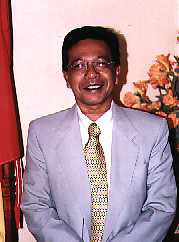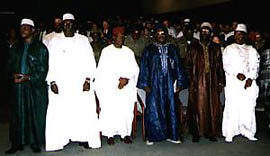 MULTINATIONAL COMPANIES MULTINATIONAL COMPANIES
 MULTINATIONAL COMPANIES FLOCK IN MULTINATIONAL COMPANIES FLOCK IN
A few multinational companies have reacted to the Guinea’s appeal . Most of them come from the energy, mining, and industrial sectors. The oil market has traditionally been dominated by multinational corporations. Shell (GB-Holland), Elf (France), and Total (France) have been present in Guinea for years. Mobil has just arrived but is strongly bidding to obtain 12% of the petrol market.
The mining sector has also known recent arrivals, such Ashanti Goldfields , the Ghanaian gold giant, which has recently invested US$50 million in production facilities. Likewise, DeBeers, the world’s diamond leader has just signed an exploitation Contract of $US150 million. And British firm Rio Tinto has opened its offices in Guinea attracted by its huge iron reserves.

After the purchase of Sotelgui (Guinea’s telecommunication company) by Malaysian Telekom the sector of telecommunications has known an unprecedented expansion. In the industrial sector, the Swiss multinational Nestlé produces concentrated broth cubes and then exports them to Western Africa. Coca Cola is well present all over Guinea.
 EFFORTS TO ATTRACT FOREIGN INVESTORS EFFORTS TO ATTRACT FOREIGN INVESTORS
The government, conscious of the need to attract further foreign investment, has carried out a series of changes making more attractive the establishment of foreign companies in Guinea. The first one, still in process, is the reform of the judicial system (also imposed by the IMF). Capital transfer is free without limits, and tax advantages for foreign companies have been implemented. To simplify administrative formalities the OPIP (Office for the Promotion of Private Investment) was created in September 1992. The OPIP - with financial and logistics help from the UNDP (UN Program for Development) and the UNIDO (UN Industrial Development Office) - organized the first International Investors Forum.
 INTERNATIONAL INVESTORS FORUM INTERNATIONAL INVESTORS FORUM
Between the 26th and 29th of May 1998 the first International Investors Forum took place in Conakry. From the onset two main goals were set for the forum. The first was to attract foreign investors. "Business people coming to Guinea" - says Prime Minister, Mr. Touré - "could see for themselves the macroeconomic changes operated in the country, check out the reforms set to improve the investment environment and discover the plentiful natural resources Guinea has to offer". The second objective, just as important, was to make Guineans realize that they should open up to the world. After almost 30 years of collectivism Guinean nationals still find it difficult to understand that it is possible do business freely with other countries.
|
The idea of the Forum came to Mr. Ben Yalla Sylla, Director General of the OPIP while he was a student abroad. He finally made his dream come true after 2 years of intense work. Firstly the sectors with highest investment potential were identified: agriculture, forestry, fishing, cattle raising, leather, textiles, beverages, chemicals, medicines, building materials, metal transformation and printing. 250 projects were chosen. Then intense diplomatic efforts were made around the world by Ministers and high personalities of the country.

Around 400 international potential investors, mostly private, participated in the forum. Of these 22, Americans representing 15 American companies came to Conakry. Out of 822 meetings 306 intention letters were signed. If all these letters end up in a business deal, US$140 million will be invested in Guinea. Not bad, especially considering that private direct investment in 1995 was less than US$15 million.
 OFFICE FOR THE PROMOTION OF PRIVATE INVESTMENTS (OPIP) OFFICE FOR THE PROMOTION OF PRIVATE INVESTMENTS (OPIP)
But the role of the OPIP does not just end in the organization of Forums. Today, after a deep restructuring process during 1997, this institution welcomes, informs, advises and orientates foreign investors who wish to do business in Guinea. The previously complicated process of establishing a company in Guinea has been dramatically reduced, simplified and entirely channeled through the OPIP.
The OPIP has also set up a program to help finance small and medium sized enterprises. Banks in Guinea are exclusively commercial, so they only finance short term commercial operations (90 days maximum). With the backing of OPIP and international donor agencies, small size enterprises can now get financial backing for up to US$50,000 payable in 5 years. Thus far 140 small enterprises have been financed this way. In view of these excellent results the OPIP together with the French Development Agency (AFD) have created a private sector observatory. This observatory allows to identify financial, technical or marketing difficulties encountered by companies already installed in Guinea and to correct or eliminate them.
Despite all this, international firms and companies complain that they still have larger tax contributions to the state than they should and their management often complains of government interference in their affairs.
Rounding off the Investors Forum, the 5th edition of the International Fair of Conakry will take place from January 20th to February 7th 1999. |

